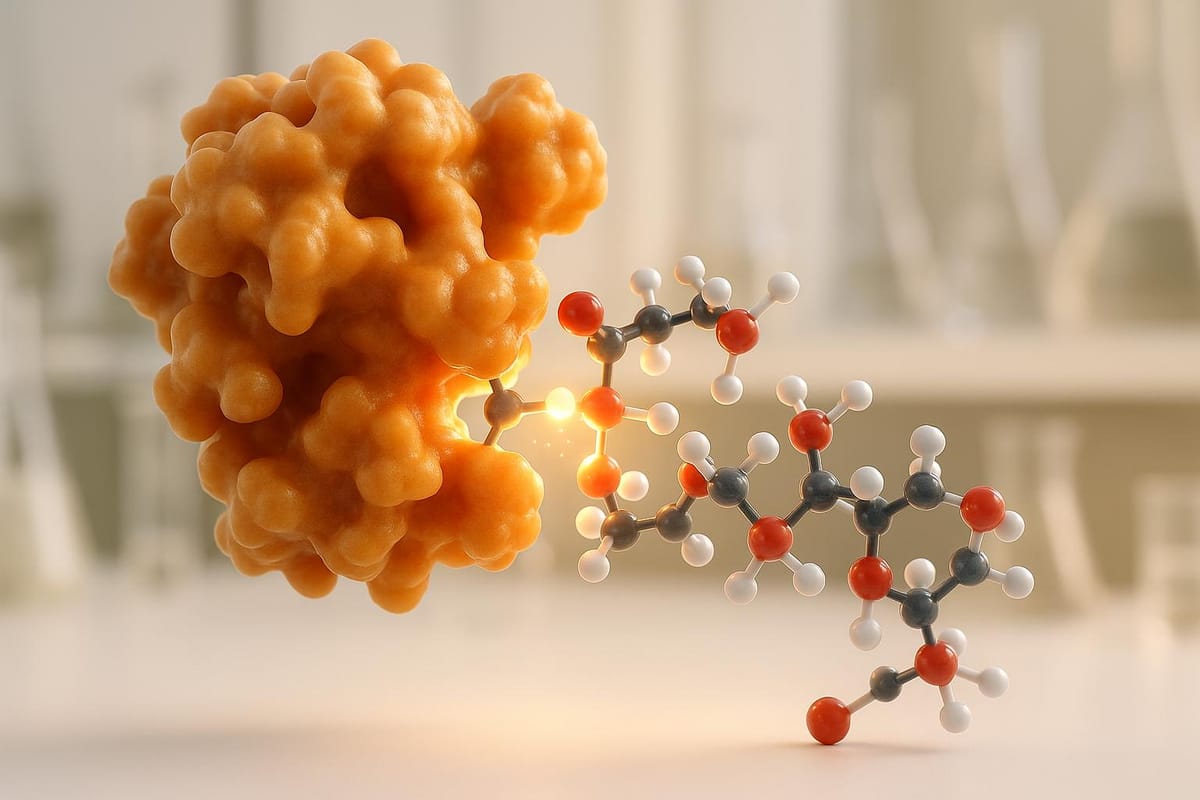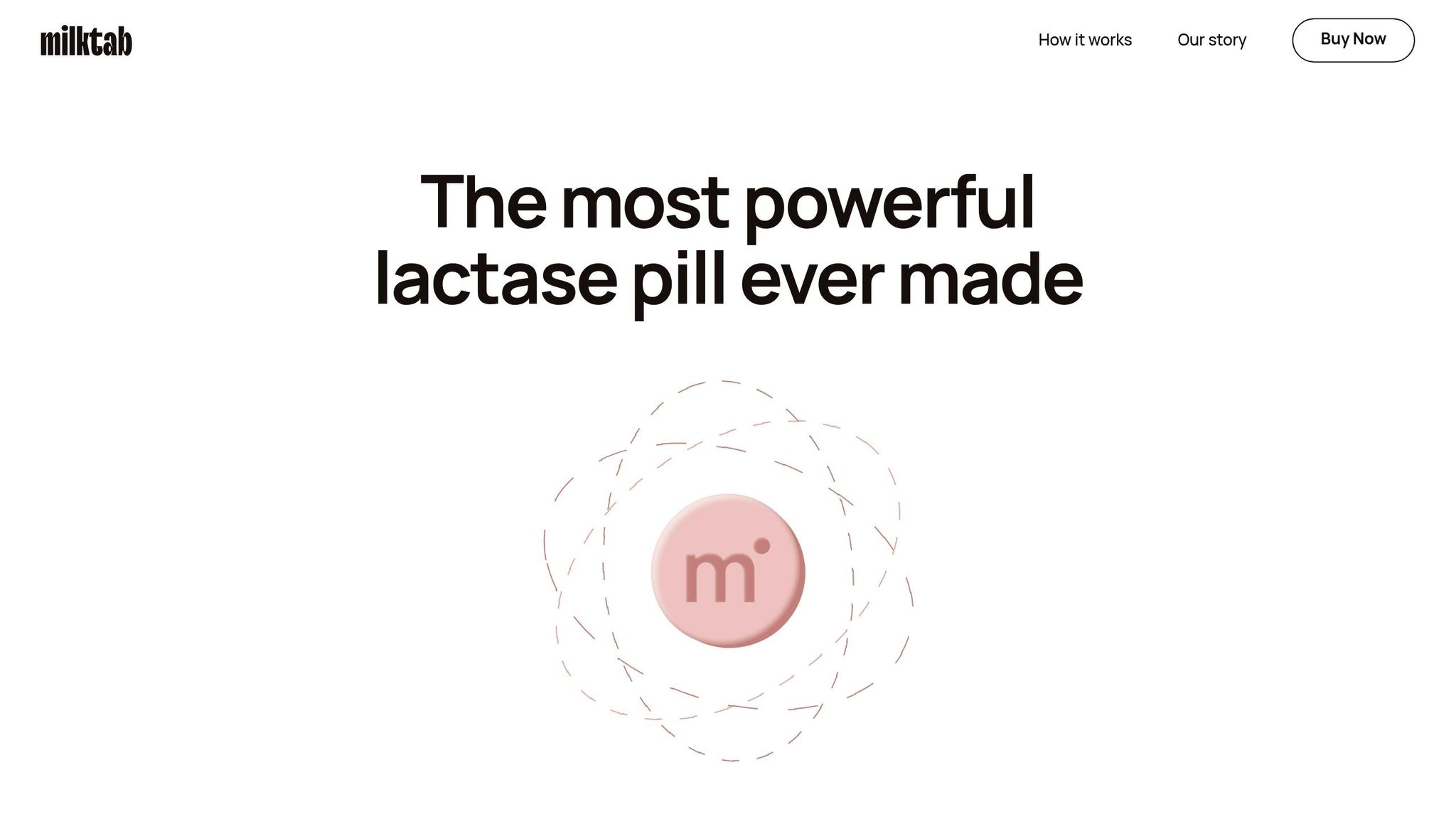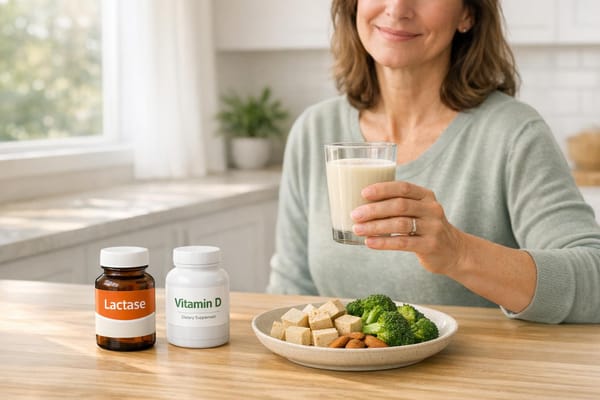Lactase Enzyme Mechanism: Explained
Explore how lactase enzymes function to digest lactose and alleviate symptoms of lactose intolerance with effective supplement options.

Lactase is the enzyme your body uses to digest lactose, the sugar in dairy. If your body doesn’t produce enough lactase, you may experience digestive discomfort after consuming dairy. Here’s what you need to know:
- What Lactase Does: Breaks lactose into glucose and galactose for absorption.
- Where It Works: Upper small intestine (jejunum) under ideal pH and enzyme conditions.
- When Levels Are Low: Lactose remains undigested, causing symptoms of lactose intolerance.
- Solution: Lactase supplements (e.g., 27,000 FCC units per serving) can help digest lactose effectively.
How It Works:
- Lactase binds to lactose at its active site.
- It splits lactose into glucose and galactose.
- These sugars are absorbed by your body.
For those with lactose intolerance, supplements like milktab combine lactase, protease, and lipase to improve digestion of dairy sugars, proteins, and fats.
| Enzyme | Function | Supplemental Units |
|---|---|---|
| Lactase | Breaks down lactose | 27,000 FCC |
| Protease | Digests proteins | 22,000 FCC |
| Lipase | Aids in fat digestion | 1,000 FCC |
Take lactase supplements before consuming dairy for the best results.
Lactase Structure and Production
Basic Structure Components
Lactase is a protein enzyme with an active site that binds to lactose, breaking it down into glucose and galactose. Let's take a closer look at how the body produces lactase to support digestion.
How the Body Makes Lactase
Lactase is produced in the small intestine by enterocytes, the cells lining the intestinal wall. These cells create and release lactase to help process dairy products. The body adjusts lactase production based on genetic predispositions and digestive needs. If natural production isn't enough, enzyme supplements can help bridge the gap.
Digestive health benefits from a mix of enzymes. While lactase is key for breaking down dairy sugars, enzymes like protease and lipase also play crucial roles in digesting proteins and fats, respectively.
| Enzyme Type | Primary Function | Supplemental Units |
|---|---|---|
| Lactase | Breaks down lactose | 27,000 FCC |
| Protease | Helps digest proteins | 22,000 FCC |
| Lipase | Supports fat digestion | 1,000 FCC |
How Lactase Works
Breaking Down Lactose
Lactase plays a key role in your digestive system by breaking down lactose, the sugar found in dairy products. When you consume dairy, lactase targets lactose and splits it into two simpler sugars: glucose and galactose. These sugars are easily absorbed by your body. If lactose isn't broken down, it can lead to digestive discomfort. This process occurs where lactase activity is strongest.
Where Lactase Works Best
Lactase functions most effectively in a specific area of your digestive system. Its peak activity happens in the upper part of the small intestine, particularly in the jejunum. Here, the enzyme operates under ideal conditions, including the right pH levels and enzyme concentrations, to efficiently break down lactose. Lactase supplements, often formulated with 27,000 FCC units, are designed to support this process and aid in dairy digestion.
The digestive system relies on more than just lactase for processing dairy. Other enzymes also play a role in ensuring smooth digestion:
| Enzyme | Location | Primary Function |
|---|---|---|
| Lactase | Upper small intestine | Breaks lactose into glucose and galactose |
Having lactase available as soon as dairy enters your system helps break down lactose quickly, minimizing the chance of discomfort.
Step-by-Step Lactase Action
How Lactase Breaks Down Lactose
When you consume dairy, lactase in your small intestine goes to work on lactose. This enzyme targets lactose specifically due to its unique structure, following three main steps:
-
Recognition and Binding
Lactase identifies lactose and attaches to it at its active site, forming a temporary enzyme–substrate complex. -
Reaction Phase
The enzyme breaks the chemical bonds in lactose, splitting it into glucose and galactose, which your body can absorb.
These steps are essential for proper digestion of lactose, especially when natural lactase levels are insufficient.
What Happens When Lactase Is Low
Low lactase levels can leave lactose undigested, leading to poor absorption and digestive discomfort after eating dairy. In such cases, a lactase supplement with 27,000 FCC units can effectively aid in breaking down lactose.
Pairing lactase with other enzymes like protease and lipase can further improve how your body processes dairy. Taking these supplements before consuming dairy ensures the enzymes are ready to help digest lactose efficiently.
Using Lactase Supplements
Taking Lactase Pills
For those with lactose intolerance, lactase supplements provide the enzymes needed to break down lactose in dairy products. These supplements work by adding lactase enzymes to your digestive system before you consume dairy, helping to ease discomfort and letting you enjoy dairy without the usual issues. Their effectiveness depends on the enzyme concentration, measured in FCC (Food Chemical Codex) units, and using them as directed. An example of this is milktab, which features a concentrated enzyme blend designed specifically for this purpose.
milktab Lactase Formula

This formula includes three key enzymes to support dairy digestion:
| Enzyme | FCC Units | Function |
|---|---|---|
| Lactase | 27,000 | Breaks down lactose |
| Protease | 22,000 | Helps digest milk proteins |
| Lipase | 1,000 | Aids in processing dairy fats |
With its high lactase content, this blend is crafted to target lactose digestion effectively.
"I have tried other products before, but with Milktab, I don't have to worry about the pill not working due to insufficient strength!" – Christina
How These Enzymes Work Together
Each enzyme in the formula plays a specific role to improve dairy digestion:
- Lactase: Handles lactose breakdown.
- Protease: Assists in digesting dairy proteins.
- Lipase: Helps break down dairy fats.
For the best results, follow the suggested dosage of two pills per day.
Lactase & the Mechanism of Lactose Intolerance
Summary
Understanding how lactase works is crucial for managing lactose intolerance. When your body doesn't produce enough lactase naturally, supplements can help fill the gap.
Here’s a quick breakdown of the key enzymes involved in digesting dairy:
- Lactase: Breaks down lactose into simpler sugars your body can absorb.
- Protease: Helps process milk proteins for smoother digestion.
- Lipase: Aids in breaking down dairy fats efficiently.
These enzymes work together to support proper lactose digestion. For those considering supplements, milktab offers 27,000 FCC units of lactase per pill, specifically designed to help with lactose digestion.
Tips for Using Lactase Supplements
- Timing is everything: Take the supplement just before eating or drinking dairy products.
- Enzyme strength matters: Look for supplements with higher FCC units for better support.
- Combination is key: Using a supplement with multiple enzymes can help with complete dairy digestion.
FAQs
How do lactase supplements compare to the body's natural lactase production?
Lactase supplements can often outperform the body's natural lactase production, especially for individuals with lactose intolerance. People with this condition produce little to no lactase, making it difficult to properly digest dairy products.
Supplements like milktab provide a concentrated dose of lactase - 27,000 FCC units per pill - designed to break down lactose effectively. This high potency helps reduce discomfort and allows for easier digestion of dairy, offering a reliable solution for those who struggle with natural lactase deficiencies.
Are there any side effects or precautions to consider when using lactase supplements like milktab for lactose intolerance?
Lactase supplements like milktab are generally safe and effective for helping individuals with lactose intolerance digest dairy. However, it’s important to use them as directed to avoid potential discomfort or overuse. While there are no formal FDA guidelines on lactose consumption, it is recommended to limit usage to no more than 2 milktab pills per day.
As with any supplement, consult a healthcare professional if you have specific health concerns or experience unexpected symptoms. Following the recommended dosage ensures the best results while minimizing any risks.
Can lactase supplements help with all dairy products, or do they work better with certain foods?
Lactase supplements are designed to help your body break down lactose, the sugar found in dairy products, making them effective across a wide range of dairy foods. Whether you're enjoying milk, cheese, yogurt, or ice cream, lactase supplements can help reduce discomfort from lactose intolerance.
However, the effectiveness may vary depending on factors like the amount of lactose in the food and your individual tolerance levels. For best results, take the supplement as directed before consuming dairy.



